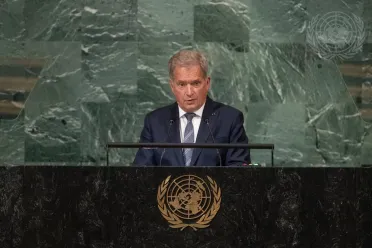Statement
Statement summary
SAULI NIINISTÖ, President of Finland, said the ripple effects of the Russian Federation’s brutal war in Ukraine are compounding the pre-existing problems faced by the international community. A triple crisis of energy, food security and finance are weighing especially heavily on vulnerable countries who are already suffering the most from the climate crisis and the pandemic. “As we gather here, we have an important opportunity to engage in dialogue, find solutions, and understand the concerns of those most in need,” he emphasized. Highlighting the international community’s common obligation to uphold the international rules-based order, he said: “We can’t accept, condone or normalize grave violations of international law and human rights.”
Commending the Secretary-General and the President of Türkiye’s tireless efforts, he said the agreement to secure Ukrainian grain transports, if implemented as foreseen, will have a major impact on the lives of tens of millions of people in need. However, to respond to the wider challenges of global food security, collective action is needed to arrive at sustainable, inclusive and fair food systems. Turning to the global climate emergency, he called on the international community to change its course “before it is too late” and support those with fewer resources to deal with the threat. Fighting climate change and taking care of the economy do not contradict each other, he underscored, pointing out that a green transition has a tremendous potential to create jobs, innovations and economic growth, as long as it is done fairly.
Thanking those who supported his country’s membership in the Human Rights Council, he said Finland remains a staunch supporter of the work of the International Criminal Court in investigating all grave violations of human rights and international humanitarian law. Noting that one quarter of humanity lives in conflict-affected countries, he asked the Assembly: “Have we done all we can to avert violence? Have we done what we can to make a positive change?” He called on Member States to build and strengthen peace and prevent conflict wherever possible, noting that the Secretary General’s report Our Common Agenda provides a blueprint for more effective multilateralism — paving a way to solutions to current and future global problems.
Pointing to the increasingly challenged international arms control architecture, he said the two biggest nuclear weapon States have a unique responsibility to advance nuclear arms control and disarmament, and others must follow suit. Progress in nuclear arms control and disarmament must continue beyond the New START Treaty, he added, calling on the United States and the Russian Federation to continue their dialogue on strategic stability with a view to achieving further cuts in their nuclear arsenals. “We must not become indifferent or apathetic in the face of these multiple crises,” he said, emphasizing that “there is still time to act”.
Full statement
Read the full statement, in PDF format.
Photo

Previous sessions
Access the statements from previous sessions.
